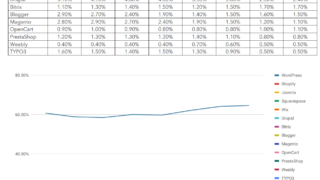Most of the Content Management Systems (CMSs) businesses use today were originally built for a single purpose — delivering content to a desktop web browser. Looking closer, WordPress — the open-source platform now used for everything from e-commerce to massive corporate sites and owning 65% of the CMS market (see the image below) — was built in 2003 as a blogging platform, competing with names you rarely hear today outside of a historical discussion.
The progress WordPress has made since its inception is undeniably admirable — it has nearly singlehandedly democratized web publishing and has remained incredibly versatile, in part because of a developer ecosystem responsible for nearly 60,000 plug-ins. This ecosystem enables the platform to be very responsive to trends — features often start as plug-ins and, as they gain popularity and utility, are later written into the core platform.

The flip side of this strength is a debilitating weakness. Bolting-on functionality inevitably results in code bloat, which means slow-loading pages that could hinder high search engine rankings — the opposite of what marketers are looking to accomplish by focusing on Core Web Vitals. Meanwhile, this vast ecosystem of plug-ins brings with it a not-insubstantial number of security vulnerabilities.
Combine this with marketers’ need to deliver content to more platforms than ever before, and you’ll understand why many are looking for an alternative to “traditional” Content Management Systems.

With a value proposition similar to a customer data platform or a digital asset management platform, the headless CMS serves as a repository for all of a company’s content — mostly textual, but also including images and other formats. It’s meant to be the “single source of truth” for content marketers and it incorporates an application programming interface (API) that allows the CMS to deliver content to any channel.
I’ll be sharing more of the results of this recently-launched research in the coming weeks. In the meantime, you can download our MarTech Intelligence Report on Headless & Hybrid Content Management Systems!
The post Looking to leave WordPress behind? You’re not alone appeared first on Search Engine Land.



